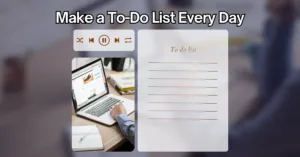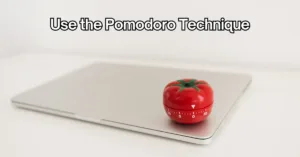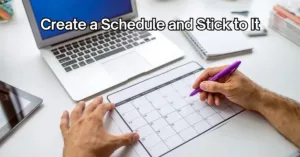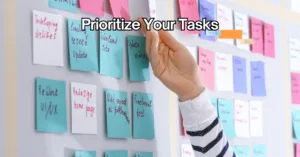
Tips and strategies for managing time, boosting focus, and staying organized.
- 121
- 0
- 0
Tips and strategies for managing time, boosting focus, and staying organized are essential for success in daily life. Time management helps you prioritize tasks and complete them on schedule, reducing stress. Boosting focus allows you to concentrate better, leading to higher-quality work. Staying organized helps you find things quickly and keeps your workspace tidy, making it easier to stay on track. Together, these skills improve productivity, increase efficiency, and create a sense of accomplishment, helping you achieve your goals more effectively.
Tips and strategies for managing time, boosting focus, and staying organized
In today’s busy world, it’s easy to feel overwhelmed by all the things we need to do. Whether you’re a student, working professional, or stay-at-home parent, good time management skills are key to getting things done and feeling less stressed. This blog post will share 7 tips and strategies for managing time, boosting focus, and staying organized.
Make a To-Do List Every Day

One of the best ways to stay on top of your tasks is to write them down. At the start of each day (or the night before), take a few minutes to list everything you need to do. This simple habit can help you in several ways:
- It clears your mind. When you write tasks down, you don’t have to worry about forgetting them.
- It helps you plan your day. You can see all your tasks at once and decide what to do first.
- It feels good to cross things off. Each time you finish a task and cross it off, you’ll feel a sense of progress.
To make your to-do list even more effective:
- Be specific. Instead of “work on the project,” write “finish the first draft of the report.”
- Break big tasks into smaller steps. This helps make tasks feel less overwhelming and simpler to begin.
- Limit your list. Try to keep it to 3-5 important tasks per day. This allows you to concentrate on what is important.
Remember, a to-do list is a tool to help you, not stress you out. If you don’t finish everything, it’s okay. Just move the leftover tasks to tomorrow’s list.
Use the Pomodoro Technique

The Pomodoro Technique is a simple but powerful way to boost your focus and get more done. Here’s how it works:
- Choose a task you want to work on.
- Set a timer for 25 minutes.
- Continue working on the task until the timer goes off.
- Take a short 5-minute break.
- After four “pomodoros” (25-minute work sessions), take a longer break of 15-30 minutes.
This method works well because:
- It breaks your work into manageable chunks. 25 minutes feels doable, even for tasks you don’t like.
- It gives your brain regular breaks. This helps you stay fresh and avoid burnout.
- It creates a sense of urgency. Knowing you only have 25 minutes can motivate you to focus and avoid distractions.
To try the Pomodoro Technique:
- Utilize a basic kitchen timer or a mobile app.
- During your work sessions, close email and social media to avoid distractions.
- Use your short breaks to stretch, get a drink, or do a quick chore.
- Adjust the times if needed. Some people prefer 30-minute work sessions or 10-minute breaks.
Create a Schedule and Stick to It

Creating a daily or weekly schedule can maximize your time effectively. Here’s why it’s helpful:
- It ensures you have time for all important tasks.
- It creates a routine, which can make you more productive.
- It helps you avoid overbooking yourself.
To create an effective schedule:
- List your regular commitments (work, classes, family time).
- Add in time for important but flexible tasks (exercise, household chores, personal projects).
- Leave some free time for unexpected tasks or relaxation.
- Be realistic about how long things take. It’s better to overestimate than underestimate.
Tips for sticking to your schedule:
- Put it somewhere you can see it often, like on your fridge or phone home screen.
- Set reminders for important tasks or transitions in your day.
- Be flexible. If something takes longer than expected, adjust your schedule instead of giving up on it completely.
- Review and update your schedule regularly. As your life changes, your schedule should too.
Minimize Distractions

In our connected world, distractions are everywhere. Learning to minimize them can greatly improve your focus and productivity. Here are some strategies:
- Turn off notifications on your phone and computer. Each ping or pop-up can break your concentration.
- Use website blockers. Tools like Freedom or StayFocusd can prevent you from accessing distracting websites during work hours.
- Create a dedicated workspace. If possible, have a specific place for work or study that’s separate from where you relax.
- Use noise-cancelling headphones or play background music to block out environmental noise.
- Let others know when you need uninterrupted time. This could mean closing your office door or telling family members you need quiet time.
Remember, it’s not about eliminating all distractions forever. The goal is to create periods of focused time when you need them most.
Use the “Two-Minute Rule”

The “Two-Minute Rule” is simple: if a task will take less than two minutes to complete, do it right away. This rule can help you in several ways:
- It prevents small tasks from piling up. These little tasks can create mental clutter and stress if left undone.
- It gives you quick wins throughout the day, boosting your motivation.
- It helps you make decisions faster about what to do next.
Examples of two-minute tasks:
- Responding to a short email
- Making a quick phone call
- Filing a document
- Putting away a few items
- Adding an item to your grocery list
While it might seem like these small tasks don’t matter much, they can add up to significant time savings and reduce stress over time.
Prioritize Your Tasks

Not all tasks are equally important or urgent. Learning to prioritize can help you focus on what matters. One popular method is the Eisenhower Matrix, which sorts tasks into four categories:
- Urgent and Important: Do these tasks right away.
- Important but Not Urgent: Schedule these for later.
- Urgent but not critical: Delegate these tasks if you can.
- Neither Urgent nor Important: Eliminate these tasks if you can.
To use this method:
- List out all your tasks.
- For each task, ask yourself:
- Is this important to my goals or values?
- Does this need to be done soon?
- Place each task in the appropriate category.
- Prioritize the “Urgent and Important” tasks first, and then address the “Important but Not Urgent” ones.
Remember, “important” tasks are those that contribute to your long-term goals and values. “Urgent” tasks have immediate consequences if not completed soon.
By prioritizing, you ensure you’re spending your time on what matters, rather than just what feels pressing in the moment.
Take Care of Yourself

Lastly, remember that good time management isn’t just about getting more done. It’s also about taking care of yourself so you can work efficiently and avoid burnout. Here are some self-care tips that can boost your productivity:
- Get enough sleep. Most adults need 7-9 hours per night. Being well-rested improves focus and decision-making.
- Eat healthy meals and snacks. Good nutrition fuels your brain and body.
- Exercise regularly. Physical activity can boost your energy and clear your mind.
- Take breaks throughout the day. Short breaks can improve your focus when you return to work.
- Utilize stress-reduction methods such as deep breathing exercises or meditation.
- Make time for hobbies and activities you enjoy. Engaging in fun activities is essential for overall wellness.
Remember, pushing yourself too hard can lead to burnout, which ultimately reduces your productivity. By taking care of yourself, you’ll have more energy and focus to tackle your tasks effectively.
Conclusion
Improving your time management, focus, and organization skills is a process. Don’t expect to master all these tips overnight. Instead, try incorporating one or two at a time into your routine. Pay attention to what works best for you and adjust as needed. Keep in mind that the aim isn’t to occupy every moment of your day with tasks. It’s to use your time wisely so you can accomplish what’s important to you and still have time for rest and enjoyment. With practice and patience, you can develop habits that help you feel more in control of your time and less stressed about your to-do list.
Start small, be consistent, and celebrate your progress along the way. Good luck on your journey to better time management.
FAQs
1. What are effective time management tips?
To manage your time effectively, prioritize tasks, set clear goals, break work into smaller steps, and use tools like calendars or to-do lists to keep track of deadlines and responsibilities.
2. How can I boost my focus while studying?
To enhance focus, create a distraction-free environment, set specific study times, use techniques like the Pomodoro Technique, take regular breaks and stay hydrated and well-nourished for better concentration.
3. What strategies can help me stay organized?
Staying organized involves decluttering your space, categorizing tasks, using planners or apps, establishing daily routines, and regularly reviewing your progress to adjust plans and stay on top of responsibilities.
4. How can I avoid procrastination?
Combat procrastination by setting clear, achievable goals, breaking tasks into smaller parts, establishing deadlines, eliminating distractions, and rewarding yourself for completing tasks, creating a sense of accomplishment to motivate you.
5. Why is it important to manage time and stay organized?
Managing time and staying organized leads to increased productivity, reduced stress, and better work-life balance. It allows you to focus on priorities, meet deadlines, and achieve your personal and professional goals effectively.
Also Read:
How to Build Strong Relationships: 7 Tips for Lasting Connections
References:
https://pmc.ncbi.nlm.nih.gov/articles/PMC4763375/
https://pmc.ncbi.nlm.nih.gov/articles/PMC9898133/
https://en.wikipedia.org/wiki/Time_management
Disclaimer: The information provided in this article is for general guidance only and may not apply to everyone’s unique situation. Always consider personal circumstances and consult with a professional if needed for tailored advice.
Related post

7 Health Benefits of Assam Tea


